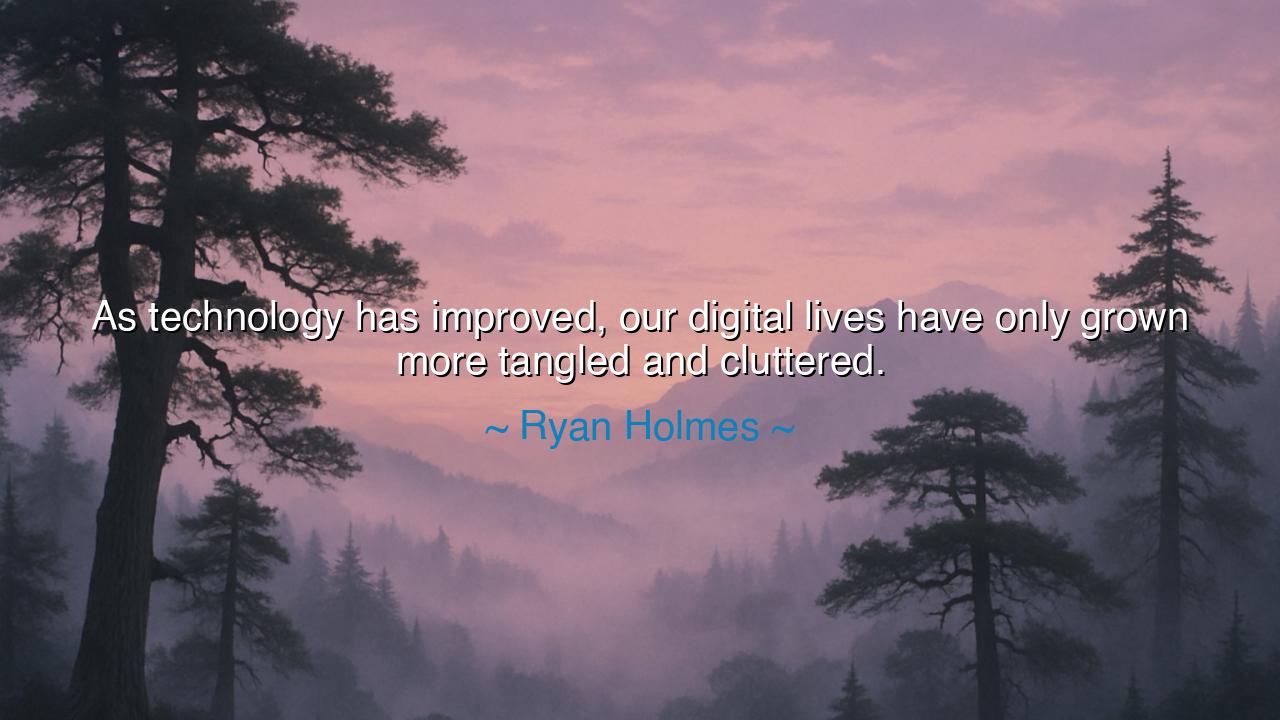
As technology has improved, our digital lives have only grown
As technology has improved, our digital lives have only grown more tangled and cluttered.






The words of Ryan Holmes, visionary of the digital age, ring like a paradoxical truth: “As technology has improved, our digital lives have only grown more tangled and cluttered.” This is no idle complaint, but a lament for a generation caught in the snares of its own invention. For though technology was born to simplify, to connect, and to serve, it has also woven webs of complexity that ensnare the very souls it was meant to free. The sword that cuts paths of progress also creates knots of distraction, burden, and endless noise.
The meaning is clear: every step forward in improvement has carried with it unforeseen entanglements. Where once a letter sufficed, now a thousand messages scream for attention. Where once the ledger was written by hand, now countless apps demand passwords, updates, and constant vigilance. This is the irony Holmes reveals — that as our tools sharpen, our digital lives do not grow lighter but heavier, cluttered not by necessity but by excess. It is as if the traveler, seeking to move faster, piles upon his back new packs, new instruments, until his swiftness is lost beneath his own load.
Consider the origin of this insight in the realm of business and society. Holmes, as founder of Hootsuite, beheld firsthand the chaos of social media — platforms multiplying, voices colliding, identities scattering into fragments across digital realms. He created tools to bring order, but even then the truth remained: the faster the river of technology flows, the more branches it creates, demanding ever more bridges, boats, and watchmen. Improvement begot complexity, and the promise of clarity was often drowned in clutter.
History offers a mirror to this condition. In the age of the printing press, knowledge spread with dazzling speed, but so too did confusion. Pamphlets, treatises, propaganda, and lies flowed together, overwhelming minds unprepared to sift wisdom from noise. The technology of ink gave birth both to enlightenment and to chaos. In the same way, the digital age has multiplied voices and tools, yet not all bring peace. Some only bind us tighter in cords of distraction, just as Holmes warned.
The lesson is profound and urgent. One must not reject technology, for it is the river upon which modern life sails. But neither must one surrender blindly to its currents. To live wisely is to master it, to cut away the clutter, to choose simplicity in the midst of abundance. Like the gardener pruning branches so that the tree may bear fruit, we must prune our digital lives — removing what steals attention, keeping only what nourishes purpose.
Practical wisdom can guide us. Limit the number of tools you use, and choose them with discernment. Set boundaries for your digital life, just as the ancients set walls around their cities to guard what was precious. Dedicate time for silence, where no notification intrudes, so that your mind may recover its rhythm. Seek mastery over devices rather than servitude to them, remembering that technology is a servant, not a master.
Thus, the teaching of Holmes endures: as our digital world expands, so too does the danger of entanglement. But the wise will not be ensnared. They will embrace improvement without surrendering to clutter, they will use the tools without being used by them. For freedom in the digital age is not found in having more, but in choosing less, and wielding it with clarity of purpose. Let this truth be passed down, as a compass for generations navigating the boundless seas of technology.






AAdministratorAdministrator
Welcome, honored guests. Please leave a comment, we will respond soon